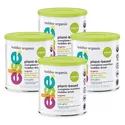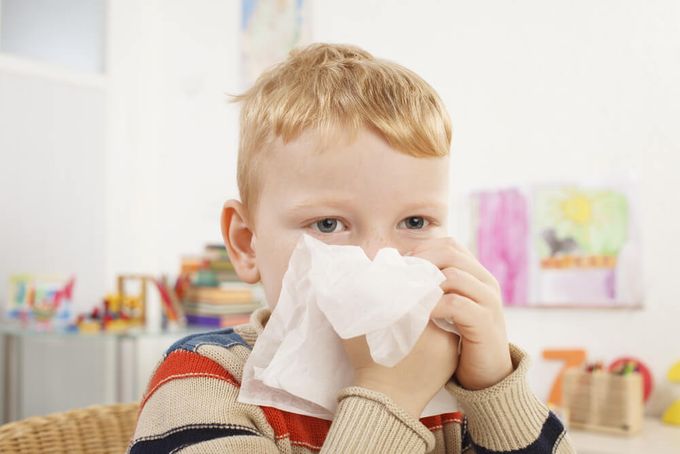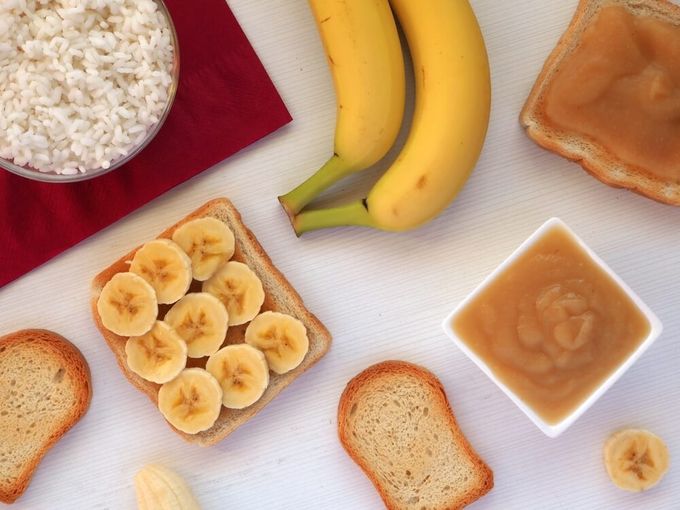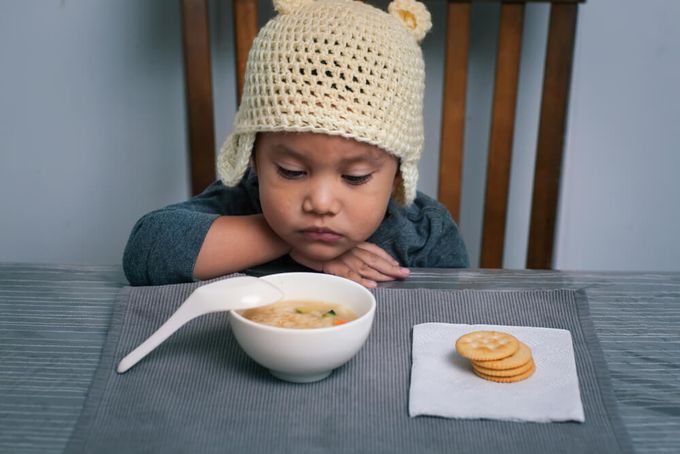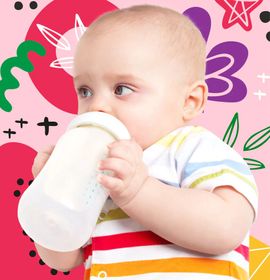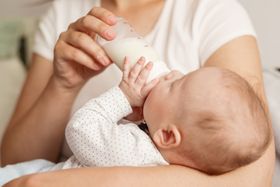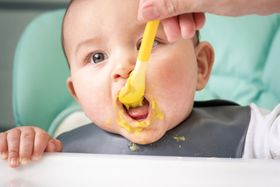Sick Toddler Won’t Eat or Drink
Struggling with a sick toddler's eating habits? Explore our guide on helpful tips for maintaining their nutrition during illness.
Updated May 16, 2024
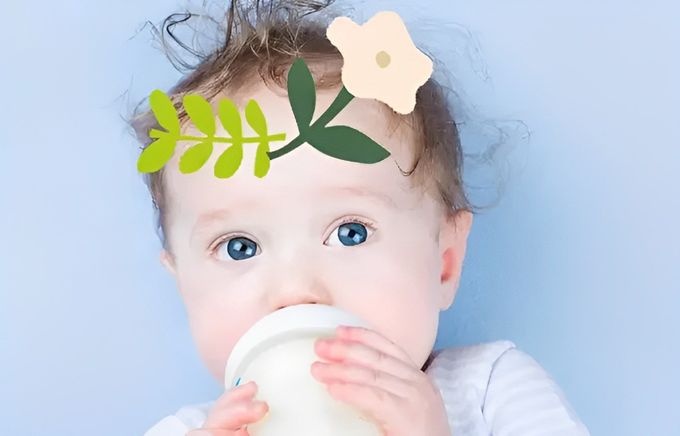
It’s common for a toddler’s food preferences and overall appetite to fluctuate over time. All parents know the frustration of a toddler who gobbles up strawberries one day and then won’t touch them the next day. The frustration is compounded when your child gets sick.
An everyday fussy eater can become next to impossible to please when they catch a cold or stomach bug.
You may not think about what foods and drinks to offer your little one when they come down with something, but a little know-how can help you prepare to nurse them back to health the next time they pick up a germ.
In this article, we’ll provide tips on how to get a sick toddler to drink and offer meal and snack ideas.
Is It Normal for Sick Toddlers to Eat and Drink Less?
It’s normal for most toddlers to experience a decreased appetite when they’re feeling under the weather. Sometimes, a child simply feels too tired or cranky to eat while their immune system is busy fighting a bug.
When your child doesn’t want to eat, you might start worrying about bad eating habits, weight loss, or nutrient deficiencies. For most mild childhood illnesses, these worries are simply anxieties we, as parents, must set aside.
Think about how you feel when you get sick. You might feel a change in appetite, be too tired to sit at the table or chew much of anything, sleep more than usual, or feel somewhat hungry, but nothing seems appealing.
A change in appetite can actually be one of the first clues that your toddler isn’t feeling well. If their food intake or interest in eating is suddenly and uncharacteristically off, it’s time to pay attention. Take inventory of any other symptoms like a fever or congestion, especially with very young toddlers who may not be able to verbalize what they are feeling yet.
That being said, there are some things you can try to help your toddler eat and drink to get the nutrition and hydration they need to support their immune systems and recover quickly.
» Read more about pediatrician's review on nutritional and healthy diet for kids
7 Tips for Feeding Sick Toddlers
1. Don’t Force Them to Eat
Forcing, bribing, and hovering over a sick toddler who isn’t showing interest in their usual meals and snacks can backfire, cause your child to eat even less, and be a stressful and unpleasant experience for all parties involved.
If your toddler won’t eat, focus on fluids. Preventing dehydration and replacing lost fluids always take priority over feeding solids.
2. Stick to Safe Foods
This isn’t the time to offer new foods or flavors. Think about how you feel when you’re sick and the foods you do and don’t crave. Chances are you reach for more comforting items, like soup, toast, or crackers, and save new recipes for another day.
3. Offer Easy to Digest Foods
Skip heavy, greasy or fried, heavily spiced, and sugary foods when your child is ill. Bland foods are usually tolerated better. This is extra important if your child is dealing with a stomach bug. Sugary, fatty, and highly seasoned foods can be hard for a sensitive belly to keep down and digest. Else Nutrition's Plant-Based Complete Nutrition Toddler Drink is a great option if your child has a sensitive stomach, as it is lactose-free.
4. Serve Smaller Portions
A large amount of food or drinks can overwhelm a kiddo on any given day, especially when they’re not feeling well. While you can—and should—try to offer them their favorite meals and snacks from their 1-year-old feeding schedule, but take into account they will be grazing throughout the day while they’re sick.
It might feel like you’re on snack duty around the clock, but trust that your child’s usual appetite and meal schedule will return when they feel better.
5. Listen to Your Child
Let them eat what they want, when they want, within reason. The human body is incredibly intelligent, and children will eat when they’re ready. If your child is asking for something in particular, let them have it. You’ll have plenty of time to return to your regular eating schedule and mealtime rules once they recover.
6. Try Probiotic Foods
If your child has been prescribed antibiotics, offering probiotic-rich foods such as yogurt or kefir can help counteract digestive upset from their medicine. You can also ask your pediatrician for recommendations for a children’s probiotic supplement.
7. Don’t Wait to Get Help
If your sick child refuses all food and drink attempts, contact your pediatrician immediately.
» Learn more about protein needs of infants and toddlers
What to Feed Sick Toddlers
Let’s review some of the most common toddler ailments, how they can affect a toddler’s appetite, and specific foods and drinks that can help manage each.
What to Feed Toddler with a Fever
When your toddler spikes a fever, they may be fussier than usual or have less energy, which can decrease their interest in doing much of anything—including eating. The biggest concern with a fever is keeping the body well-hydrated to prevent dehydration.
If your child complains of feeling hot or cold when they have a fever, you can offer cooling or warming liquids to help them feel more comfortable. Try to provide their usual meals and favorite foods if they have a fever with no other symptoms, but as always, don’t force or bribe them to eat and take your cues from your child.
Head and chest colds are often accompanied by congestion, runny nose, and cough. Fluids and foods with a high water content are your toddler’s best friend while they fight off a cold. They can even help thin mucus, so it’s easier to get out when children cough or blow their nose.
The steam from warm foods can also help loosen mucus and relieve nasal congestion. Warming soups, broths, hot chocolate, and non-caffeinated tea (with supervision) are all good options.
» Boost your child's natural immunity with nutrition
What to Feed Toddler with a Sore Throat
The pain of a sore throat can make swallowing food and liquids uncomfortable, which may make your toddler eat less even if they feel hungry. Acidic foods can irritate an already inflamed and sore throat.
It can help to skip foods and drinks like orange juice, pineapple juice, orange slices or segments, tomato juice, and tomato soup until your toddler’s sore throat has healed.
Instead, giving them extra cold or warm liquids may be soothing and offer relief from a sore throat. You can try offering:
- Smoothies blended with frozen fruit and ice cubes
- Popsicles
- Frozen yogurt or ice cream
- Ice water
- Cold apple juice or cider
- Cold pudding
- Hot chocolate
- Herbal, non-caffeinated tea
What to Feed Toddler with Diarrhea and Vomiting
If your child is vomiting or has diarrhea, you may be tempted to wait until it passes to offer food or drink. However, vomiting and diarrhea can quickly dehydrate a child.
The most important thing to remember if your child is vomiting or has diarrhea is to keep giving them small amounts of fluids to help replace what’s being lost.
Try offering 1 or 2 tablespoons (1 or 2 ounces) of water, coconut water, or an electrolyte replacement solution every 15 to 30 minutes if they’ve been vomiting or had diarrhea. Also, steer clear of sweetened drinks and juices since sugar can worsen diarrhea.
Small amounts will likely be better tolerated than getting them to drink a full cup.
If they keep small sips of fluids down, increase the amount of fluid you give them every 15 to 30 minutes.
The “BRAT diet” advises feeding bananas, rice, applesauce, and toast for stomach ailments. These foods contain simple carbohydrates that provide energy and are easy to digest.
Hydrating Foods and Drinks for Sick Toddlers
Fever, diarrhea, vomiting, or just refusing liquids for a prolonged period can put your toddler at serious risk for dehydration. If you’re concerned your toddler is dehydrated, contact your pediatrician immediately.
The best way to prevent dehydration and replace fluids lost through vomit, diarrhea, or sweat is to keep a cup full and encourage your child to sip from it throughout the day. Using a favorite cup, crazy straws, or liquid dropper to “squirt” liquids from a cup sparks a toddler’s interest in drinking more.
Water is the best choice, but if you’re finding it a struggle to get them to drink it, here are some other drink ideas:
- Else plant-based formulas for toddlers and kids
- Coconut water
- Watered down juice
- Milk of choice
- Clear broths
- Popsicles
- Smoothies or milkshakes made with fruit, milk, yogurt, or Else plant-based formulas
If your toddler is still breastfeeding, you can nurse or offer expressed milk as much as possible while they’re sick. Breast milk is hydrating and offers nutrients they may be missing from solid foods while they’re sick.
If your child is refusing fluids, try offering foods with a high water content. These include:
- Yogurt
- Pudding or chia pudding
- Store-bought puree or smoothie pouches
- Watermelon
- Cantaloupe
- Honeydew melon
- Pineapple
- Apples
- Strawberries
- Peaches
- Cucumbers
- Zucchini
- Carrots
- Tomatoes
- Lettuce
» Discover alternatives to Enfagrow toddler formula
Meal and Snack Ideas for Sick Toddlers
In addition to the above ideas, here are some other meal and snack ideas that are simple to prepare and serve and have blander flavors preferred by sick toddlers.
- Toast: Choose 100% whole grain or sprouted toast for additional fiber, vitamins, and minerals. You can also try creative toast toppings to entice your sick toddler to take a few bites. Try nut butter, mashed strawberries or raspberries, mashed banana and cinnamon, or hummus and cream cheese.
- Pancakes or Waffles: Try making your own batter with a whole grain mix, adding in mashed banana and pumpkin puree, or blending the batter with spinach for extra fruits and vegetables.
- Soups and Broths: Chicken noodles or chicken rice is usually a kid-pleaser. Vegetable rice soup is a good option for vegetarian and vegan families.
- Plain Cereal, Pasta, or Rice: Choose 100% whole grain and sugar-free cereals.
- Fruit: Softer varieties are usually better tolerated when kids don’t feel well. Try strawberries, blueberries, raspberries, bananas, and ripe pears.
- Vegetables: Try soft steamed or roasted vegetables, like carrots and broccoli. Offering a dip such as hummus, ketchup, or ranch dressing can help entice your toddler to nibble some veggies, but don’t be surprised if your toddler turns up their nose at vegetables when they're not feeling well.
- Scrambled Eggs: They are soft and protein-rich, providing essential nutrients to help your sick toddler regain strength.
- Oatmeal Made with Dairy or Nondairy Milk or Formula: Oatmeal prepared with milk or formula provides a comforting and healthy choice, offering your toddler energy to fuel their day.
- Mashed Potatoes or Sweet Potatoes: They are easy to swallow and provide carbohydrates for sustained energy during illness.
- Applesauce with Cinnamon: This combination adds a touch of flavor and provides vitamin C and antioxidants to support your toddler's immune system.
» Discover healthy toddler meal ideas for picky eaters
Should My Sick Toddler Avoid Dairy?
Some people avoid milk, yogurt, and cheese when they're sick, believing it can worsen the congestion accompanying head and chest colds. There’s no scientific evidence that dairy increases mucus production or thickens mucus, so this theory may be an old wives' tale.
Still, deciding on serving dairy to your sick toddler isn’t a straight-cut yes or no. Some people do notice they feel worse when they’re sick and eat dairy.
Sick toddlers don’t need dairy since there are many other foods and drinks you can offer them to meet their nutrition and hydration needs. However, if your toddler is used to drinking a cup of cow’s milk in the morning or is asking for a grilled cheese sandwich, these familiar foods may be a comforting source of nutrition when they’re not feeling well.
Of course, if your toddler doesn’t usually eat much dairy, there’s no reason to offer it when they’re sick.
The best thing you can do is take note if your sick toddler’s symptoms seem to worsen after a cup of milk or yogurt. If you notice any changes or are worried dairy could potentially worsen their congestion, it’s best to skip it.
The Else product line is full of nutritious, non-dairy alternatives to milk that can be served on their own or blended with fruit and vegetables to make a smoothie or “milkshake.” Non-dairy yogurts made from coconut milk or cashews can also be a good alternative for kids who love yogurt but may need to skip it while they heal from a cold.
Serving dairy when your toddler is battling a stomach bug can be iffy. Sensitive stomachs may have a hard time digesting dairy. Again, it’s best to skip cow’s milk and recipes made with dairy if you’re in doubt. Once your little one has recuperated from a bout of vomiting or diarrhea, it’s fine to offer cow’s milk and other dairy foods again if they want it.
Seeing your toddler feel unwell and trying to manage their symptoms is a troubling experience, but it’s something most parents go through at one point or another. Offering simple foods and drinks and prioritizing rest can help your little one get back to running, playing, and eating normally in no time.
The content and advice provided in this article are for informational purposes only and are not a substitute for medical diagnosis, treatment, or advice for specific medical conditions. Always consult a pediatrician to understand the individual needs of your child.




